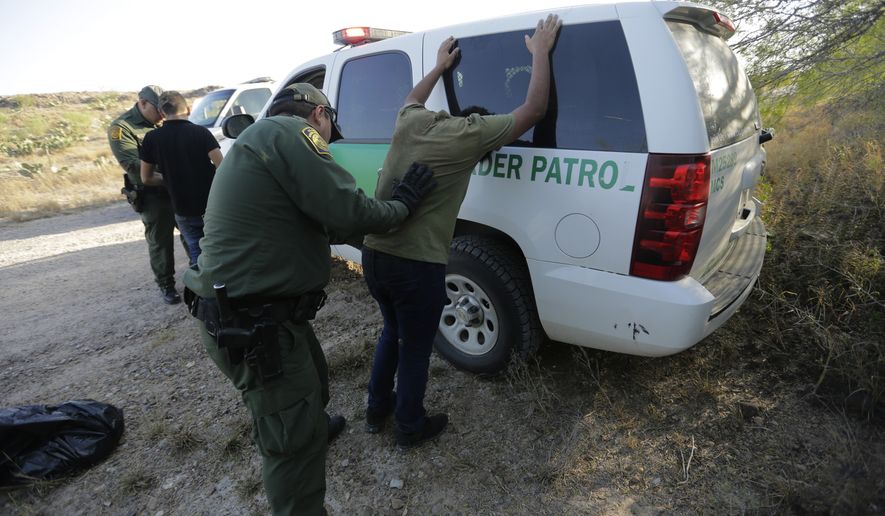Homeland Security has solved the Central American migrant surge from earlier this year, ending 95% of catch-and-release at the border, a top official said Tuesday — but he warned the cartels are already shifting their tactics to entice other migrants to make the journey.
And acting Customs and Border Protection Commissioner Mark A. Morgan also warned the government may not meet its own goal for construction of miles of President Trump’s border wall by the end of next year.
“Our goal at the end of 2020 is 450 miles. It’s hard right now to say whether we’re still gong to be able to meet that goal, but I’m confident we’re going to be close,” Mr. Morgan told reporters.
So far, just 93 miles has been built — all of it replacing old, outdated fencing. No new miles of the border have been fenced in on Mr. Trump’s watch, though officials say that’s coming soon.
Mr. Morgan was delivering an update on progress made six months after Central American children and families set new records for illegal immigration into the U.S.
Mr. Morgan also delivered new evidence of the callousness of the cartels that control the smuggling routes to the U.S., pointing to a truck stopped at a Border Patrol checkpoint this week.
He said they found immigrants who were living in the country illegally inside wearing shirts with letters branded on their clothing with spray-paint, which he said appeared to be a cartel system for identifying and moving the people “literally like a piece of cattle.”
“When you see these pictures, I hope that you have the same level of disturbance,” Mr. Morgan told reporters as he discussed the tactics.
The flow of people from Central America has dried up as federal officials have found ways to combat the loopholes migrants had been using to gain a foothold in the United States.
Cooperation with Mexico, Guatemala, Honduras and El Salvador, as well as stiffer standards for claims here in the U.S., have created consequences for 95% of people who enter the country illegally, Mr. Morgan said.
Some are returned to Mexico to wait for immigration hearings under the Migrant Protection Protocol, while others can now be more quickly sent back to Central America.
Word has gotten back to that region that the old loopholes are no longer working, and the number of Central American families is down 85% compared to the nearly 90,000 migrant families — by far a record — who jumped the border in May.
It’s made a major dent in the cartels’ bottom line, Mr. Morgan said.
“We have probably removed a couple billion dollars from their illicit criminal scheme,” he said.
But they’re already finding replacement clients, he said.
They’ve begun to advertise in Mexico, seeking to entice more people there to make the trip. And they are looking “extracontinental,” he said, recruiting migrants from across the globe.
The change in tactics shows up in the numbers.
Southeastern Arizona, which had been relatively unscathed by the migrant surge compared to parts of Texas and western Arizona, saw its arrest numbers more than double from October to November as migrants thought they could take advantage of loopholes there.
Human rights groups say the better border numbers overall are not without a cost.
The Washington Office on Latin America released a report Tuesday looking at Mexico’s stepped-up efforts, under threat of punishment by Mr. Trump, to police its own borders.
Mexico deployed 12,000 members of its new national guard to its own southern border, and set records for its own apprehensions of immigrants living in the U.S. illegally. That’s left its own detention facilities at the breaking point, WOLA said, with some at 300% capacity.
“Thousands of migrants are stranded in Mexico’s southern border zone, where many have fallen victim to crime and abuse,” WOLA said in its report.
While Mexico’s facilities are bursting at the seams, U.S. border facilities are in much better shape now, compared to the peak of the crisis.
In early June, Homeland Security said it had nearly 20,000 people in custody in facilities that were designed for quick processing — similar to a police station’s holding cells.
Immigrant-rights groups and Democrats in Congress had complained that migrants were being maltreated during the overcrowding, including one report from Democrats who said a migrant had told them she was ordered to get drinking water from a toilet.
CBP never substantiated that claim.
Mr. Morgan did acknowledge the overcrowding, but says things have improved greatly. Now, about 4,000 migrants are in CBP custody on the average day. Mr. Morgan said that’s right at capacity.
The acting commissioner also made a pitch for Mr. Trump’s border wall, saying it not only fends off migrants but can help stop the flow of illegal drugs, which he said is getting worse.
CBP says its goal is to have 450 miles built by the end of 2020, with another 59 miles in construction.
Of that, only 165 miles will fence off parts of the border currently without any barrier. Another 57 miles will add a new secondary line of fencing where none exists.
The rest — about 287 miles — will replace existing barriers.
The Trump administration is battling in federal courts to keep construction on track. Judges in El Paso and California have ruled in recent weeks against Mr. Trump’s move to shift billions of dollars in Pentagon money into wall building.
• Stephen Dinan can be reached at sdinan@washingtontimes.com.




Please read our comment policy before commenting.